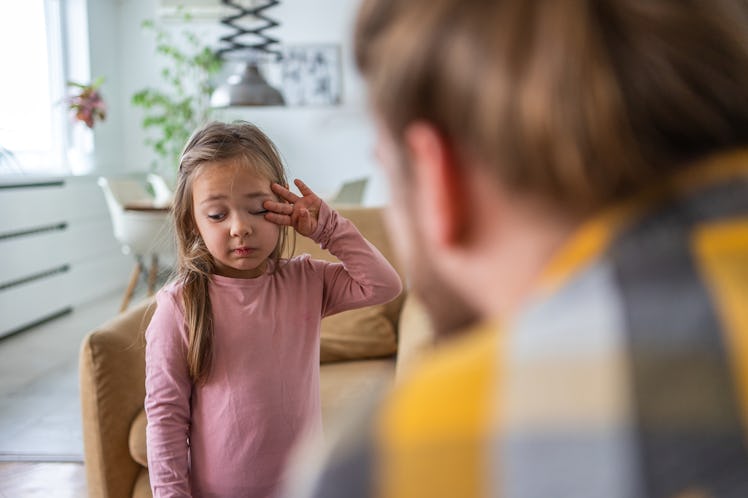How To Help A Kindergartner Overcome New School Anxiety
Kids who are considered emotionally and socially unprepared for Kindergarten may just be feeling anxiety that can be soothed with some intentional practice.

Kindergartners who have school anxiety may behave in ways that make them seem emotionally immature or anti-social. It’s possible that they are one or both of those things. It’s also possible that they’re just nervous for understandable reasons. Children entering school who’ve had little preparation in preschool or limited experience with peer groups are probably right to be nervous. It’s heady stuff. So, before the pressure of school causes a child to withdraw or lash out, parents need to address anxiety head-on.
The process should begin with parents really figuring out where the pain points are, explains Joani Geltman, clinician, parenting coach, and child development professor at Curry College. “What’s going on? What is causing their kid to get frustrated and throw a tantrum or not talk in class?” she encourages parents to ask. “Find out form the teacher what are the specific time and circumstances that causes kid’s anxiety.”
How to Help a Child with Anxiety About School
- Speak with the child’s teacher to develop a partnership and get them on board with solving the problem.
- Determine the exact circumstance or circumstances that cause the child anxiety.
- Acknowledge the fear instead of minimizing it by telling the child there’s nothing to be scared of.
- Practice appropriate ways to respond in the scary situations through practice and roleplay at home, disguised as play.
- Encourage adaptive measures in the classroom that allow a kid to practice skills they are confident with rather than putting them on the spot.
Of course, a couple of things need to occur in order for parents to understand the issue. From the outset, parents should work closely with teachers. “You call it a partnership,” Geltman explains because teachers are responsive to parents asking for help. And there’s no shame in asking. Not all parenting tasks are intuitive. “Sometimes parents need direction as well. It’s just not something that comes naturally to them.”
What does come naturally is a need to soothe a kid’s anxiety. But sometimes the soothing is misguided, coming off more as an attempt to minimize their fear. “They’re trying to make a kid feel less anxious, more than trying to identify what they are feeling,” Geltman says. But understanding the feelings has to occur first. A bit of empathy lays a foundation for a way forward. “There has to be a process to transition a kid from fear to no fear. Create a goal of building confidence. Take it in steps.”
Once parents and teachers have a common understanding of where children become most anxious, and that anxiety is acknowledged and not minimized, parents can begin coaching a kid towards confidence. Importantly, coaching implies practice. Parents shouldn’t expect kids unaccustomed to their new school reality to simply jump in and start swimming. They may need to rehearse being confident before actually becoming confident.
“Set up those situations at home and make a game,” says Geltman. That might mean roleplaying circle time, or recess, by using stuffed animals as stand-ins for friends. It might mean rehearsing show-and-tell or playing a game of “school” that includes being called on by a teacher. Or the practice could be focused, short playdates with other children.
“It shouldn’t be a lecture,” Geltman says. “It’s just practicing.”
And with teachers as partners, parents can coordinate with the classroom. Once a skill like being present and active during circle time has been practiced, it can then put it to the test. “The teacher can do a little directive conversation because they’ve already practiced this,” Geltman explains. “You want to build up positive experience and then that confidence takes them into a school setting.”
Aside from practice, parents and teachers should also consider being adaptive. Maybe a kid doesn’t need to address the entire class during show and tell, and instead simply show and tell with a couple trusted friends. Maybe instead of speaking, they can show a picture. “So instead of setting them up to feel anxious, give them something to do that they already have confidence in, rather than putting them on the spot,” Geltman says.
With both practice and adaptation, a kid with school anxiety should be able to eventually thrive in their own way. “Maybe they won’t be the kid who will raise their hand a thousand times in the classroom,” Geltman says. “But when they’ve developed mastery of a subject they will be able to raise their hand because they’ve practiced and the worst thing they thought would happen didn’t happen.”
This article was originally published on